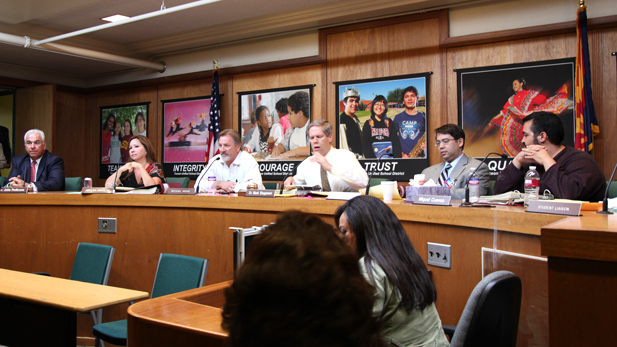 TUSD’s superintendent John Pedicone, with board members Adelita Grijalva, Michael Hicks, Mark Stegeman, Alexandre Sugiyama and Miguel Cuevas
TUSD’s superintendent John Pedicone, with board members Adelita Grijalva, Michael Hicks, Mark Stegeman, Alexandre Sugiyama and Miguel CuevasTucson Unified School District governing board members voted on two issues Tuesday night: whether to approve a proposed desegregation plan, and whether to accept the part of the plan regarding classes that teach Mexican American history and culture.
The plan, written by a special master appointed by federal court, included his recommendations for the district, along with side notes that detailed objections from TUSD and from the other parties involved.
One of those objections from TUSD officials was to the multicultural curriculum.
At the meeting, board member Mark Stegeman wanted to add three more objections to the plan, one about the formation of a special task force, one about deadlines for hiring and another one to emphasize his opposition to the plan's order to teach Mexican American literature and social studies.
Board member Adelita Grijalva, a supporter of the now-defunct Mexican American studies classes, said she supported the plan and Stegeman's first two objections, but wanted to take the objection to the curriculum out before voting to accept the plan.
Attorneys at the meeting suggested that the board should vote twice, once to approve the plan and the second time to approve Stegeman's third objection to the curriculum. At the time, this second vote was not explained thoroughly.
"I thought by separating the votes we would be voting on the plan without the objection to the classes first, then on the objection to the classes by itself," Grijalva said. "I guess I assumed and several other people, including our legal, also assumed that this was a vote to remove the objection from TUSD."
Based on the unanimous vote not to object to the classes, it appeared the district's governing board reversed its previous objection to classes that teach Mexican American and African American history and culture.
The plan written by the federally-appointed special master does not mention the now defunct Mexican American Studies classes by name, but does order TUSD to offer classes that “integrate racially and ethnically diverse perspectives and experiences."
In January, the board voted 4-1, with Grijalva dissenting, to shut down its Mexican American studies classes after the Arizona Department of Education said the classes violated a newly passed state law supported by Tom Horne, who was state superintendent of schools and later was elected state attorney general.
The district was threatened with loss of up to $15 million in state funding if it did not comply with the law.
Horne continues to oppose the Mexican American studies curriculum in TUSD.
The special master noted in the latest version of the plan that he changed it based on comments at three public hearings in Tucson.
The master will revise the plan and submit a final version to federal court Friday. A decision from a federal judge is expected in January.
The decades-long desegregation issue began in 1974, when parents of Mexican American and African American students sued TUSD for what they called discrimination against their children.
The parents were represented by the National Association for the Advancement of Colored People and the Mexican Legal Defense and Educational Fund.
The federal government intervened in 1976 in what became known as the Fisher/Mendoza case.
A few years later, the parties reached a settlement requiring TUSD to go under a desegregation order monitored by the U.S. Justice Department’s Unitary Status Plan.
The 1978 desegregation order remained in effect until 2009, when TUSD filed a petition with a local district court to terminate federal oversight of the district.
"The court has acknowledged that the district will operate for the advocacy and equal advantage of every child," TUSD officials said at the time. But the plaintiffs in the original desegregation case appealed that decision.
The 9th Circuit Court of Appeals reversed the district's status and appointing a special master to develop a new Unitary Status Plan in January.

By submitting your comments, you hereby give AZPM the right to post your comments and potentially use them in any other form of media operated by this institution.